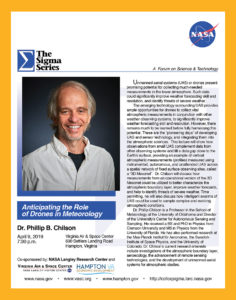Anticipating the Role of Drones in Meteorolgy
Phillip B. Chilson
April 9, 2018 at 7:30 P.M. at the Virginia Air and Space Center in downtown Hampton, Virginia
Abstract
Unmanned aerial systems (UAS) or drones present promising potential for collecting much-needed measurements in the lower atmosphere. Such data could significantly improve weather forecasting skill and resolution, and identify threats of severe weather.
 The emerging technology surrounding UAS provides ample opportunities for drones to collect vital atmospheric measurements in conjunction with other weather observing systems, to significantly improve weather forecasting skill and resolution. However, there remains much to be learned before fully harnessing this potential. These are the “pioneering days” of developing UAS and sensor technology, and integrating them into the atmospheric sciences. This lecture will show how observations from small UAS complement data from other observing systems and fill a data gap close to the Earth’s surface, providing an example of vertical atmospheric measurements (profiles) measured using instrumented, autonomous, and unattended UAS across a spatial network of fixed surface observing sites, called a “3D Mesonet”. Dr. Chilson will discuss how measurements from an operational version of the 3D Mesonet could be utilized to better characterize the atmospheric boundary layer, improve weather forecasts, and help to identify threats of severe weather. Time permitting, he will also discuss how intelligent swarms of UAS could be used to sample complex and evolving atmospheric conditions.
The emerging technology surrounding UAS provides ample opportunities for drones to collect vital atmospheric measurements in conjunction with other weather observing systems, to significantly improve weather forecasting skill and resolution. However, there remains much to be learned before fully harnessing this potential. These are the “pioneering days” of developing UAS and sensor technology, and integrating them into the atmospheric sciences. This lecture will show how observations from small UAS complement data from other observing systems and fill a data gap close to the Earth’s surface, providing an example of vertical atmospheric measurements (profiles) measured using instrumented, autonomous, and unattended UAS across a spatial network of fixed surface observing sites, called a “3D Mesonet”. Dr. Chilson will discuss how measurements from an operational version of the 3D Mesonet could be utilized to better characterize the atmospheric boundary layer, improve weather forecasts, and help to identify threats of severe weather. Time permitting, he will also discuss how intelligent swarms of UAS could be used to sample complex and evolving atmospheric conditions.
Speaker
Phillip Chilson is a Professor in the School of Meteorology at the University of Oklahoma and Director of the University’s Center for Autonomous Sensing and Sampling. He received a BS and PhD in Physics from Clemson University and MS in Physics from the University of Florida. He has also performed research at the Max-Planck Institut für Aeronomie, the Swedish Institute of Space Physics, and the University of Colorado. Dr. Chilson’s current research interests include investigations of the atmospheric boundary layer, aeroecology, the advancement of remote sensing technologies, and the development of unmanned aerial systems for atmospheric studies.
